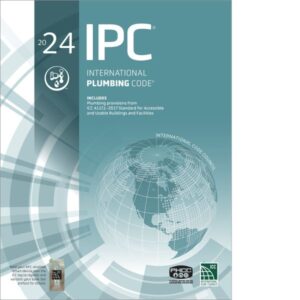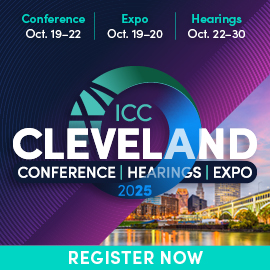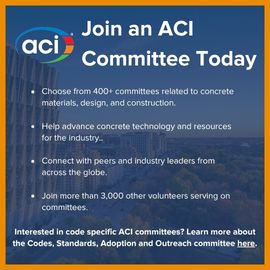
International Code Council Recognizes the Importance of World Plumbing Day
To bring attention to the importance of plumbing, sanitation and fresh water, World Plumbing Day highlights the essential role of plumbers and code-compliant plumbing systems in improving public health and protecting the environment.
For an estimated two billion people around the world who lack access to safe, clean water, and the 3.6 billion people living without basic sanitation, the absence of indoor plumbing and running water is a significant hardship that directly threatens their health and well-being.
The absence of these crucial systems not only poses major health risks but also serves to inhibit agriculture and other economic activities. According to UNICEF, four billion people experience severe water scarcity for at least one month each year, and some 700 million people could be displaced by intense water scarcity by 2030.

World Plumbing Day
To bring additional attention to the importance of plumbing, sanitation and fresh water, World Plumbing Day — an international event celebrated on March 11 every year — highlights the essential role of plumbers and code-compliant plumbing systems in improving public health and protecting the environment.
Individuals, companies and organizations worldwide, including the International Code Council, are pursuing efforts to bring effective plumbing and sanitation facilities to those who currently don’t have access.
The plumbing industry is a leader in efforts to promote water-related sustainability, particularly through its support for technologies bolstering water reuse and recovery, including desalination, solar water heating and the management of gray water and rainwater. Additionally, the plumbing industry understands first-hand the need to continually develop ever-better building, plumbing and green codes to help guard water through proper construction, conservation and safe disposal.
The Code Council offers modern, up-to-date building codes and standards that lead to resilient communities, safe plumbing, efficient technologies and a well-trained, professional workforce of code officials and plumbing professionals to design, install and maintain these systems.
The International Codes
The International Codes® (I-Codes) are a family of 15 coordinated building codes developed by the Code Council, many of which work together to ensure safe plumbing systems in both residential and commercial buildings.

The International Plumbing Code® (IPC) is not just a code, but a part of a complete building safety system, providing an integral component necessary to stay current with the latest building safety technologies while meeting the public health, sanitation and safety requirements. The IPC is a performance-based code, very flexible in its approaches to water-saving and efficiency issues, as well as water reuse options.
The International Residential Code® (IRC) contains many of the same water efficiency and water reuse provisions that are noted in the IPC — these all-encompassing options provide detailed methods for collecting, storing and using various types of non-potable water. The code recognizes the growing need for water conservation and the increase in the development of water conservation programs.
The International Green Construction Code® (IgCC) contains even more provisions for the collection, treatment and storage and use of non-potable water in the form of onsite collected rainwater and gray water, and externally treated reclaimed water supplied to the site.
The International Private Sewage Disposal Code® (IPSDC) includes provisions for design, installation and inspection of private sewage disposal systems, and provides flexibility in the development of safe systems. The IPSDC facilitates the use of the latest science-based best practices and innovative technologies in safely handling onsite, decentralized wastewater where connection to a public sewer system is not possible. The IPSDC also addresses inconsistencies within many regulations that dictate how decentralized systems can be designed, installed and operated.
The International Water Conservation Code Provisions® (IWCCP) is the best and most comprehensive tool for the design, installation and administration of potable and non-potable water conservation and efficiency systems. It contains all the water conservation and hot water energy-saving requirements from the I-Codes for both residential and commercial occupancies including provisions from the IgCC and International Energy Conservation Code® (IECC).
See Related: Updated Rainwater Harvesting Standard: Conserving Water for the Long Run
Resources Offered Through the Code Council
The Code Council’s involvement with water-related issues goes well beyond offering model codes — it works to build a well-trained workforce of code officials and plumbing professionals to maintain advanced water systems. The association offers specifically designed certification programs for inspectors, examiners, contractors and trades, which include:
- Residential Plumbing Inspector
- Commercial Plumbing Inspector
- Plumbing Plans Examiner
- National Standard Master Plumber
- National Standard Journeyman Plumber
- National Standard Master Plumber with Gas
- National Standard Journeyman Plumber with Gas
- National Standard Residential Plumber
The Code Council also provides a full suite of training and education courses geared specifically for the IPC and IRC. Instructors provide hands-on, practical problem-solving training and are available to teach on-site single- or multi-day courses.
The ICC Evaluation Service (ICC-ES) PMG Listing Program assists code enforcement professionals in determining whether plumbing products comply with codes and applicable standards.
The ICC-ES PMG program provides a comprehensive evaluation of plumbing, mechanical and fuel gas codes and standards as well as proof of compliance with the IgCC, green rating systems, WaterSense, ICC-ES Acceptance (or Listing) Criteria, Canadian plumbing standards, the Unified Water Label, recognized through Europe and the WaterMark Program in Australia.
The PMG Listing Directory provides details on all products certified by ICC-ES and PMG listing criteria can be developed when there are no consensus standards or equivalent available for a product seeking to become certified to the IPC. Additionally, ICC-ES is a licensed certifying body to the U.S. Environmental Protection Agency’s WaterSense program for water closets, lavatory faucets, showerheads, urinals and weather-based irrigation controllers.
Get Involved: Highlighting the Plumbing Industry
Construction professionals around the globe are banding together to learn how the plumbing industry continually improves the products and services the industry offers for both commercial and residential projects. The Code Council recognizes World Plumbing Day and solutes the many plumbers and plumbing-related organizations working to improve public health and safeguard access to fresh potable water.
Additionally, the Code Council’s World Water Awareness initiative raises awareness about the global water crisis and the collective responsibility to address it through long-term, consistent water conservation efforts. Throughout March, the Code Council is hosting several webinars highlighting solutions and initiatives from around the world that are working to address the water crisis.
If you would like to learn more about resources and support for plumbing code adoption, visit the Code Council’s PMG webpage.
To stay updated on the latest PMG industry news, subscribe to the Code Council’s PMG newsletter here.








